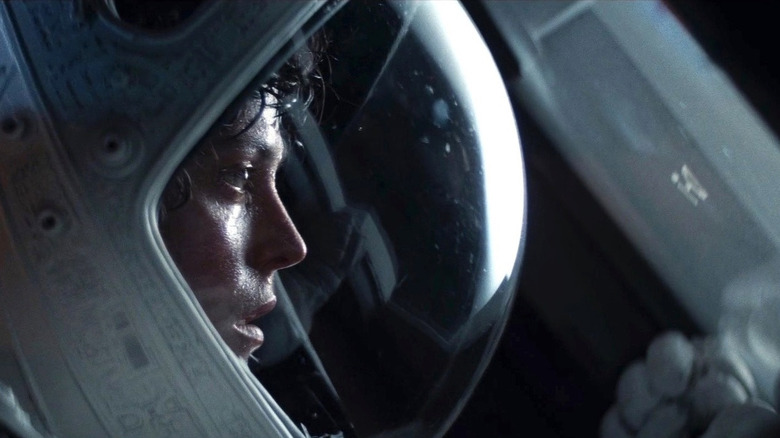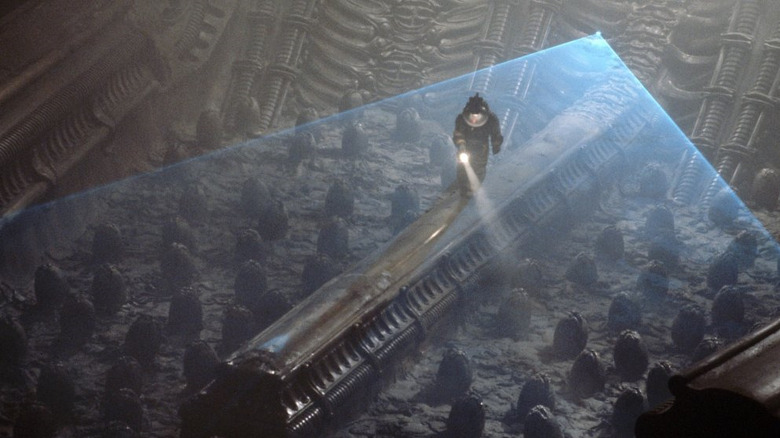Ridley Scott Knows No Sequel Will Ever Top The Original Alien
Ridley Scott is known for not mincing his words, or sugarcoating them. Over a five-plus decade career, the writer-director has not only stood at the helm of celebrated films like "Blade Runner" and 2021's "The Last Duel," he has made headlines for speaking his mind with little regard for whose feathers he ruffles. In 2019, the 40th anniversary of his 1979 horror picture "Alien," the director didn't exempt himself from his own criticisms in an interview
with The Hollywood Reporter. Despite coming back to direct "Alien" prequels "Prometheus" and "Alien: Covenant," Scott acknowledges that nothing can beat the OG, which he characterized to the Los Angeles Times as "a great B movie ... that elevated itself." He said to The Hollywood Reporter:
"There's only ever the one. It's like trying to do a sequel to '2001.' Fundamentally, you can't. Really, with the greatest respect to 'Star Wars,' the best film by far is the one that George directed, right? By miles. It was unique. It was absolutely wonderful to me. It was the fairy story of all fairy stories in space. And to follow through is a tough call. So, same with 'Alien.'"
Two other sci-fi films swirled together in the head of the director, creating a tempest from which a xenomorph would eventually emerge. While his film "The Duelists" was showcased to industry folks around Los Angeles, Scott caught a showing of "Star Wars" at Grauman's Chinese Theatre (now TCL Chinese Theater) and marveled at how hyped the audience was. When the script for "Alien" came, he chased the hype while doing an about-face from the romance and clean design of George Lucas' space opera. As he developed the story, Scott pulled from Stanley Kubrick's existential crisis-among-the-stars "2001: A Space Odyssey," the first movie to raise the idea for Scott that computers can outwit man. The result was a commercial success, grossing over $106 million and spawning three sequels, two crossover mashups, two prequels, and an upcoming television series. Initial mixed reviews gave way to its legacy as one of the most beloved sci-fi-horror films of all time.
'You get to the point when you say, "Okay, it's dead in the water."'
In his interview with The Hollywood Reporter, Ridley Scott notes while he returned to the franchise for its prequels, 20th Century Fox never called him when the time came to do "Aliens." "I was such a tough guy when I was doing it they didn't want me back," he told THR.
One of the appeals of prequels like "Alien: Covenant" was it afforded Scott to play with the formula, rather than flogging a dead Facehugger:
"I think 'Alien vs. Predator' was a daft idea. And I'm not sure it did very well or not, I don't know. But it somehow brought down the beast. And I said to them, 'Listen, you can resurrect this, but we have to go back to scratch and go to a prequel, if you like.' So we go to Prometheus, which was not bad actually. But you know, there's no alien in it, except the baby at the end that showed, itself, the possibility. ... The alien [origin concept] is uniquely attached to Mother Nature. It simply comes off a wood beetle that will lay eggs inside some unsuspecting insect. And in so doing, the form of the egg will become the host for this new creature. That's hideous. But that was what it was. And you can't keep repeating that because the joke gets boring.
The sentiment might put a bee in the bonnet of horror fans who enjoy the different iterations of evil and creativity in sequels in a genre that trades heavily in them. It might even be hard to find a consensus among cinephiles that "Alien" was the best of the bunch. "Scream 2" contains a classroom discussion of how sequels generally disappoint; "Aliens" is held up as an example of a follow-up that surpasses its predecessor. Where most can agree is in Scott's insistence that for a franchise to sustain itself, one can't keep doing the same thing — the organism must grow and evolve.

